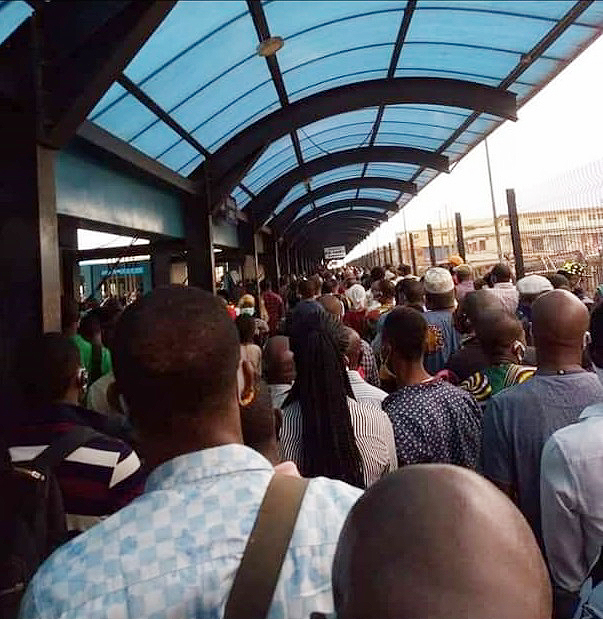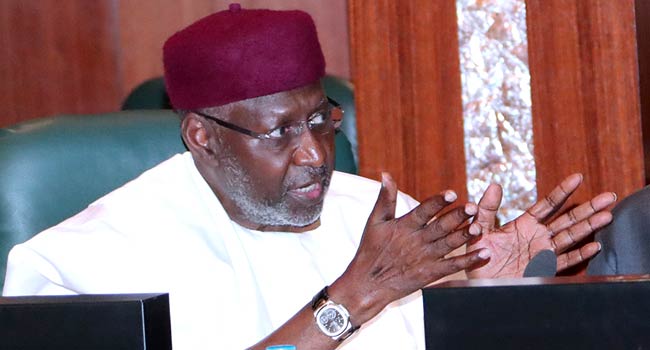Funmilola Ajala looks at the challenges of containing the coronavirus pandemic in her home country, presenting the stark choices before Nigerian leaders as well as the potential dangers ahead as Africa’s most populous nation relaxes its lockdown measures after several weeks.
In French art, there is a popular saying which goes thus: on s’engage, et puis on voit, meaning ‘engage first, then think through it’. That seems to capture the unfolding response of Nigeria to the plague of coronavirus in the country.
On Wednesday, 29 April, Governor of Lagos, Babajide Sanwoolu, sent jitters down the spine of residents when he – in his now daily media briefing on coronavirus in the state – announced 87 new cases of the viral infection in the State putting its 20 million inhabitants on the edge. Same day, Nigeria declared 196 positive tests, a record at the time. Incidentally, those figures came only forty-eight hours after President Muhammadu Buhari decreed a phasal reopening of Nigeria after a five-week halt in commercial and social activities across cities where the infection was most ravaging.
Nigerians had reacted angrily to the initial reluctance of the Presidency to take the bull by the horn, especially when coronavirus crept into the country via an Italian traveller to Lagos at the end of February. Although he gave no reason for the inaction of the preceding weeks when he made his maiden coronavirus broadcast to his countrymen and women sometimes in March, President Buhari’s lethargy must have been informed by few concerns.

First, Nigeria’s oil-fuelled economy had become convulsive in the wake of a faltering price of crude oil in the international market. Second, grounding daily operations at seaports and airports means byes to a substantial part of government’s revenue backbone. Thirdly, there was simply not enough tanks in Nigeria’s healthcare armoury to wage a decisive combat against the virus.
As the shutdown ends after five weeks, it is critical to assess the gains accrued when the lockdown lasted. But before that, one must not lose sight of the original intention behind the forced home stay. With virologists’ admission that the availability of vaccines against the virus may take a longer time than anyone could anticipate, global leaders had to invent restrictive measures among their subjects in order to, first, contain the grim reaper and, second, to afford the authorities ample time needed to expand response capacity of healthcare services.
Understandably, Lagos appears to have upped the ante rushing through a combination of public and private endowments to augment the number of ICU (Intensive Care Unit) beds and other equally sensitive amenities. Sadly, same cannot be said elsewhere. The more the virus hit new communities, daily, the more visible the point of the country’s shameful reality is driven home. The unexplained spike in death toll in Kano further exposes the hogwash of the system as reports indicate medical personnel have abandoned their duty posts due to lack of personal protective equipment.

In five weeks, Nigeria failed to stretch its daily testing capacity beyond little over a thousand per week. More so, considerable length of time is still lost between when tests are conducted and results released by the Nigeria Centre for Disease Control (NCDC). In addition, the few available isolation centres in the country remain a far cry in the face of anticipated exponential surge in infections. As of 2 May, only 17,566 tests had been conducted by the NCDC with 2,388 confirmed cases and 85 deaths.
The chair of the task force set up by President Buhari to arrest the scourge jolted many when he acknowledged the precarious state of health facilities in the country. Days after the inauguration of the task force, Boss Mustapha, who is also the Secretary to the Federal Government, lamented that “the country lacked what is required to handle the situation”.
It is a sad statement of fact that the elite class in Nigeria can no longer feign ignorance of the very fate they imposed on citizens on the wrong end of the social ladder. The mosquito-infested public hospitals now represent a collective shame of a nation as medical tourism to India, the United Kingdom and China is suspended, at least for the time being.
The despair in the air could not be more damning than the jubilation which greeted the arrival of a 15-man medical team dispatched to Nigeria by the Chinese government; the team was preceded by a share of emergency materials donated to Africa by Chinese billionaire, Jack Ma. While these scenarios were unfolding, the country’s Ministry of Finance was condemned for scanning the internet begging Elon Musk, founder of electric car maker Tesla, to gift the country a few of his ventilators.
More than any other revelation COVID-19 has exposed the effects of decades of lack of planning, prodigal spending, corruption, and dearth of leadership direction among Nigeria’s ruling class. Unfortunately, the most lethal of the consequences is being felt by teeth-gnashing downtrodden in the society.
A careful look at the trajectory of the epidemic suggests that Nigeria is just entering the most daring period of the crisis. In the last week of April, a thousand new cases were reported totalling 2,000 overall; it took two months between February and April to reach the first thousand. At the risk of sounding unnecessarily alarmist, the battle so far is a child’s play compare to what lies ahead. A compromised security system that has failed to stop inter-state journeys coupled with the unwilling carriers of the disease in ‘deported’ Almajiris can only add to the spiraling statistics in northern Nigeria.
India is one of the countries with longest nationwide lockdown. Despite the United Nations’ estimate that as many as 400 million Indians are at risk of extreme poverty, Prime Minister Narendra Mordi has refused to yield position maintaining that if the apocalyptic contagion was not handled well, “then our country, your family will go backwards by 21 years”. At the onset, Mordi was criticized for lagging in initiative but India has since increased its test laboratories from one to two hundred and twenty between January and April.
Nigeria’s neighbour, Ghana may relapse into another round of coronavirus epidemic. After locking down the country for almost one month, President Nana Akufo Addo relaxed restrictions amidst mounting pressure allowing Ghanaians back on the streets. Within days, the wisdom or otherwise of that decision is been debated as new infection rates jump above 60%. Similarly, there is a consensus that Germany’s approach to the virus was perhaps the best the world over. That was until last week of April when major sectors of the economy reopened. Many in ‘Deutschland’ are now worried that the accolades may have been premature, after all, as daily infections appear to be on the rise.
It would, notwithstanding, be foolhardy to reason that President Buhari, having suffered a personal loss to coronavirus in the person of his confidant and Chief of Staff, Abba Kyari, knows nothing about the pains the virus is inflicting on the common man. Not at all. The president is just susceptible to the vagaries of his advisers who must have sermonised him of the social implications posed by a crumbling economy which now stirs the government in the face if people remain out of work. This is a dilemma of a man desperate to escape being sandwiched between the devil and the deep blue sea. In the end, whatever decision taken would be out of no luxury.
Speaking like a typical scientist that he is, the NCDC Director-General, Dr Chikwe Ihekweazu, cautions against any such belief that an end to the pandemic is anywhere near. “But the reality is that we are going to live with COVID-19 for the next year, at the very least. So, we have to start thinking about how to live safely with COVID-19,” he warned recently.
As the breath of fresh air badly missed to hustle for daily bread by the masses is restored, Nigerians need not surrender to the delusion that the worst is over. As Boss Mustapha retorted, the country is only entering a new phase, the one in which people’s disposition to “personal and collective responsibilities” would determine who – and who doesn’t – live to tell the tales of the era in years ahead.
*Ajala, a Nigerian journalist, writes from Berlin, Germany.
 THE AFRICAN COURIER. Reporting Africa and its Diaspora! The African Courier is an international magazine published in Germany to report on Africa and the Diaspora African experience. The first issue of the bimonthly magazine appeared on the newsstands on 15 February 1998. The African Courier is a communication forum for European-African political, economic and cultural exchanges, and a voice for Africa in Europe.
THE AFRICAN COURIER. Reporting Africa and its Diaspora! The African Courier is an international magazine published in Germany to report on Africa and the Diaspora African experience. The first issue of the bimonthly magazine appeared on the newsstands on 15 February 1998. The African Courier is a communication forum for European-African political, economic and cultural exchanges, and a voice for Africa in Europe.






















